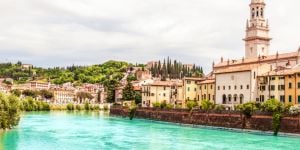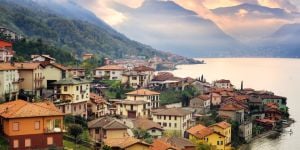
Are you planning to move to Italy? Before arriving in Italy, whether you are a student, a worker, or a job seeker, make sure you have initiated and/or completed certain formalities, and prepared all the necessary documents in order to comply with all the entry requirements. In addition, it is useful to find out about the procedures to follow once you are here in order to save time. In this article, we will try to give you some useful tips for a successful move to Italy.
Formalities to be completed before traveling to Italy
European citizens
EU, EEA and Swiss citizens do not need a visa to enter Italy. Residents of Schengen countries can also stay in Italy for a maximum of 90 days, or three months, without a visa. To check whether your country of residence is part of the Schengen area, consult the Schengen Visa Info website.
After three months, you must register with the civil registry office of the municipality where you live.
Third country nationals
If you are a citizen of a third country, you will need a visa, "Visto d'ingresso", to enter Italy. The application is made at the Italian Embassy or Consulate in your country. Once you have arrived in Italy, you have eight days to report your presence on the territory and request your residence permit, which will allow you to work in Italy. Please note that the visa will be different, depending on the type of work/activity: employee, self-employed, seasonal or student. For more information on long-stay visas, please refer to our articles "Long-term visa for Italy" and "Short-term visas for Italy".
Children traveling alone must also present an exit permit on departure and on arrival in Italy.
You can find more information on the Italian Ministry of Foreign Affairs website.
Formalities to be completed on arrival in Italy
If, as a European citizen, you plan to travel to Italy for less than 90 days, you must complete the declaration of presence form (Dichiarazione di presenza) within eight days of entering Italy. If, on the other hand, you intend to stay in Italy for more than 90 days, you must register with the civil registry of your municipality. Your stay will be guaranteed under the following conditions:
- if you provide proof of salaried or self-employed employment (permanent or fixed-term employment contract, VAT number, an entry in the company register, etc.) or that you have sufficient financial means to support yourself and your family so that you are not dependent on the state (via self-declaration);
- be enrolled at a school, university or other training facilities;
- be a family member of someone who has already provided the evidence listed above.
You will be asked for this information in addition to the following documents:
- a copy of your national identity card (or passport) and of your tax code (to be requested from the Italian Consulate before your departure or from the Agenzia delle Entrate once you have arrived in Italy) ;
- a copy of a household composition to be requested from your Consulate/Embassy together with the sworn translation;
- proof that you have international health insurance coverage in Italy (for example, a certificate).
Formalities for international students traveling to Italy
Students from the European Union do not need a visa to study in Italy. However, diplomas obtained abroad must be legalized in accordance with Italian law. Each document must be accompanied by an official translation into Italian and presented to an Italian diplomatic-consular representation. The Italian embassy or consulate will provide a declaration of value (Dichiarazione di valore), confirming that the grades are equivalent to the Italian education system. Once in Italy, students must enroll directly at the university.
Students from non-EU countries should apply for a visa (online or in person, or by pre-registration) in advance, as the procedures are lengthy. Once the application has been accepted, non-EU citizens residing abroad must submit a visa application to the Italian diplomatic representation (embassy, consulate) of the country of origin (where the Dichiarazione di valore must be made).
All documentation must be translated by a state-approved translator and notarized.
Once the visa is in hand, students must go personally to the university to register (Immatricolazione) and then apply for the long-term residence permit (Permesso di soggiorno a motivo di studio) within eight days of their arrival in Italy. This permit is renewable every year and can be renewed for a further year after graduation in the context of finding a job in Italy.
Good to know:
International students in Italy are advised to register at the University, request the tax code, and register with the health services (Servizio Sanitario Nazionale) before applying for the residence permit, as all these documents help to speed up the procedure.
Health requirements for traveling to Italy
It is recommended that you visit your doctor about four to six weeks before your trip to check that all your vaccinations are up to date and that you have taken all other necessary preventive measures. Currently, no specific vaccination is required for traveling to Italy, but if you have any concerns, your consulate can provide you with practical and useful information on the health issue.
Make sure you take out travel and health insurance before you leave.
Healthcare in Italy is of good quality, and in addition to the public health system called Sistema Sanitario Nazionale (SSN), there is also a well-developed private healthcare network, although this depends on the region. In the north of the country, in general, and in Lombardy, in particular, healthcare is efficient and well organized.
Once you arrive in the country, go to one of the SSN ASL (Azienda sanitaria Locale) offices in your new city to register and apply for a health card. You will need to provide a certificate of residence and proof of your professional and/or personal situation (household composition).
Traveling to Italy in the Covid 19 era
If you are wondering about travel restrictions in Italy during the pandemic, it's worth noting that as of June 1, 2022, the "Green Pass" is no longer required for entry into Italian territory for European and non-European citizens. The "Passenger Locator Form" has been abolished as well. However, a decree of 28 December 2022 requires all travelers from China to undergo an antigenic stamp upon arrival in Italy, even in case of transit.
At present, in order to limit the spread of the coronavirus, it is still compulsory in Italy to wear a mask in certain places such as doctors' surgeries and other health facilities such as hospitals, nursing homes, etc., where you will be asked to wear an ffp2 mask or a surgical mask.
Good to know:
If you are a citizen of an EU member state, you are eligible for a free European Health Insurance Card (EHIC), which entitles you to all types of treatment during your stay, including illness and hospitalization. But keep in mind that this does not replace medical and travel insurance, as it does not cover possible medical repatriation, ongoing treatment, or non-emergency treatment.
Currency in Italy
Italy only uses the Euro. If you use other currencies, make sure to exchange a small amount of money before you arrive. That way, you can get a favorable exchange rate. Alternatively, you should know that most major international banks operate in Italy, especially in Milan and Rome. In addition, there are specialized credit cards, which are free of transaction, withdrawal and interest charges (subject to specific conditions). Ask your bank for more information about this alternative before traveling to Italy.
Driving in Italy
If you plan to drive in Italy, make sure you have an up-to-date and valid license. If you are an EU citizen, a driving license issued in an EU state will suffice, provided that the validity dates of the license comply with the relevant EU regulations (art. 7 of Directive 2006/126/EEC). At the end of this period of validity, you must apply for an Italian driving license. For licenses that do not have expiry dates or for which these dates exceed the limit set by European regulations, you must convert your license no later than two years after taking up residence in Italy.
Citizens whose driving license was not issued in an EU Member State will have to exchange (convert or renew) their driving license within one year of arriving in Italy, provided that the country of origin has signed a reciprocity agreement with Italy. To do so, you will have to apply to the local authorities, the Ministry of Transport Agency (Ufficio della Motorizzazione Civile) competent for the province in which you live.
Good to know:
For driving licenses issued in some third countries, you may be asked to provide a certified translation. Have this document ready to attach to your conversion/renewal application.
By law, you must be able to prove your identity at all times. Copies of identity documents are sometimes accepted, although the authorities may ask you to present the original documents within 24 hours. The police will always ask for your passport or identity card and an original driving license.
Finding your bearings in Italy
It is worth doing some research on the area you will be settling in. Italy is a large country with many geographical features, such as numerous mountain ranges, a large amount of sea, several volcanoes, etc. For example, while Italy is a relatively safe country, many areas are on a major seismic line, where minor tremors are common.
You should also find out about road networks, airport connections and public transport in the area you wish to settle in.
For more information or an update on a particular situation, visit the Protezione Civile website.
Getting around Italy
You can travel to Italy by land, by sea or by air. In the north of the country, there is a well-developed road infrastructure, making towns and streets easily accessible, while in the south, it is less so, although still developing. The railway network extends over some 15,000 kilometers across the country.Traveling by train in Italy
Italy operates a reasonably priced, reliable and efficient rail network that covers the whole country and connects most major cities. There are three different types of trains in the country, varying in price and speed: Frecce, high-speed trains, Intercity and regional trains.
Traveling by coach in Italy
Coaches are a widely used means of transportation in Italy. It is reliable and economical and allows you to reach many cities not served by train. Oraria Autobus provides useful information on coach timetables in each region. Check My Bus is an excellent resource for searching for buses operating in specific cities and provinces.
Traveling by car in Italy
Italy has an extensive and well-connected road network consisting of motorways (Autostrade), major state roads such as the motorways (Strade Statali), regional roads (Strade regionali), provincial roads (Strade provinciali) and local roads (Strade Locali).
Please note that motorways in Italy are subject to a charge, and if you wish to avoid queues at toll booths, especially at weekends and during holiday periods, you are advised to take out a pass, for example, the Telepass. For more details on traffic conditions, routes and tolls, visit autostrade.it.
Traveling by boat in Italy
To reach the islands, such as Sicily, Sardinia and other smaller ones, there is a well-developed ferry system. Traghetti Lines, for example, allows you to book ferries in the Mediterranean to and/or from Italy. In addition, on the northern lakes such as Lake Maggiore, Lake Como or Lake Garda, it is also possible to travel by boat, for example, via Navigazione Laghi, which provides all kinds of boats for transporting passengers and vehicles.
Traveling by plane in Italy
As Italy is a relatively large country, it is common for Italians to travel by plane. If you live in Milan and want to travel to Sicily, for example, the most direct way is from Malpensa or Linate airports. The country also has other important airports, such as Fiumicino and Ciampino in Rome. All are served by frequent daily flights to and from all over the world.
Relocating to Italy
If you decide to move your belongings to Italy, prepare at least three months in advance and choose your carrier carefully. This is an important step that should not be taken lightly. A removal consultant may be able to come to your home to assess the volume of items to be transported. You must specify which objects or goods require special precautions (special packaging, etc.). You should also specify the tasks you will be taking care of yourself (dismantling furniture, packing dishes, etc.).
Before moving to Italy, make sure you have an up-to-date identity document. If you are a European national, you will not be subject to customs duties and will be able to move freely within the Schengen area.
If you come from a country outside the European Union and want to move your main residence to Italy, you can benefit from an exemption from import duties on your personal belongings if you have stayed in that third country for at least 12 months. Personal property is defined as anything that is for the personal use of the person concerned or for the needs of their family, for example, objects and household stuff, motor vehicles, or household provisions. If you are transporting other types of goods, please refer to the European Regulation setting up a Community system of reliefs from customs duty (CE 1186/2009).
The Italian Customs Agency can provide you with further information on international relocation to the country so that you can be aware of specific special provisions or obtain information on prohibited products.
Useful links :
We do our best to provide accurate and up to date information. However, if you have noticed any inaccuracies in this article, please let us know in the comments section below.












Comments
1